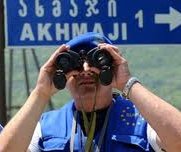
TBILISI, DFWatch – The de facto foreign ministry of Georgia’s breakaway region Abkhazia has declared the head of the EU observers a persona non grata.
As a consequence, the ministry canceled the 36th planned meeting of the incident prevention mechanisms on Tuesday.
These meetings started after the 2008 Russo-Georgian war and bring together operative leaders from all sides to clear up misunderstandings and solve practical problems in the border areas. The talks are facilitated by the EU Monitoring Mission (EUMM) to Georgia.
Abkhazian news agency Apsnypress quotes the de facto foreign ministry stating that EU mission is no longer clearly conducting its monitoring impartially and objectively. One the reasons given is that EUMM head Andrzej Tyszkiewicz didn’t pay attention to the process of setting up illegal paramilitary groups in Georgia. Information about the groups was released by one of the opposition leaders, Irakli Alasania.
Shota Utiashvili, spokesperson for Georgia’s interior ministry, says that there was agreement at the beginning of the meeting that all parties would prepare members of its delegation and other party would not intervene in this process; thus announcing Andrzej Tyszkiewicz as a persona non grata is a violation of this agreement.
“I think it’s impossible to continue the meeting at this stage. I don’t know, what happens next,” he says.
The statement by the Abkhazian de facto foreign ministry says it is unacceptable of the EU mission to refuse to observe severe incidents, including murders and political blackmailing in the so-called border zone. They say General Andrzej Tyszkiewicz ignores their appeals, and that he demands to let the EU mission onto Abkhazian territory, which it considers illegal.
“By his actions, or more correctly inaction, Mr Tyszkiewicz actually undermines the effectiveness of the mechanism for preventing and responding to incidents, the current level of understanding of the parties, as well as the whole spirit of constructive negotiation process; unacceptable and insulting remarks of Mr. Tyszkiewicz to the Abkhaz side, shown by his disregard for the Abkhaz people and state,” the statement says.
Paata Zakareishvili, who monitors conflicts in the Caucasus and is a member of Georgia’s Republican Party, thinks it’s a Russian initiative, aimed at changing the policies of the EUMM.
He thinks that by canceling the meeting, Abkhazians made a kind of walk-out to attract attention and show the EU that their intentions are serious.
“They are irritated at the fact that Tyszkiewicz more likely implements Georgian governmental policy, rather than neutral, as his predecessor did. At the Geneva meeting which was held in March, complaints were expressed towards the chair of the mission and it seems that Abkhazians are intending to seriously fight to change policy of the EU observation mission, and probably they will achieve it,” he adds.
U.S. Ambassador to Georgia said the U.S. strongly supports the activities of the EU mission. “EU observation mission fulfills important work and supports gathering objective information from territory near the border,” he said.
Also the co-chairs of the Geneva talks responded to the cancellation of the meeting.
In a common statement by EU, UN and OSCE special representatives expressed concern about the incident, saying that such a precedents should be avoided from the beginning. It can be directed against interests of all participants, when these interests are directed at providing security and stability.
A few months after the Russo-Georgia war in 2008, the warring parties agreed to meet regularly within what is called the incident prevention mechanism. At these meetings, parties can bring up issues like illegal border crossings and prisoner exchange.

